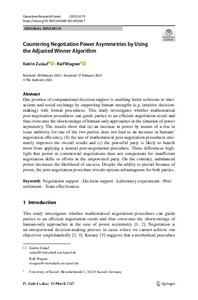| dc.date.accessioned | 2023-03-27T14:05:42Z | |
| dc.date.available | 2023-03-27T14:05:42Z | |
| dc.date.issued | 2023-03-10 | |
| dc.identifier | doi:10.17170/kobra-202303277718 | |
| dc.identifier.uri | http://hdl.handle.net/123456789/14540 | |
| dc.description.sponsorship | Gefördert im Rahmen des Projekts DEAL | ger |
| dc.language.iso | eng | |
| dc.rights | Namensnennung 4.0 International | * |
| dc.rights.uri | http://creativecommons.org/licenses/by/4.0/ | * |
| dc.subject | Negotiation support | eng |
| dc.subject | Decision support | eng |
| dc.subject | Laboratory experiments | eng |
| dc.subject | Post-settlement | eng |
| dc.subject | Team effectiveness | eng |
| dc.subject.ddc | 330 | |
| dc.title | Countering Negotiation Power Asymmetries by Using the Adjusted Winner Algorithm | e |
| dc.type | Aufsatz | |
| dcterms.abstract | One promise of computational decision support is enabling better solutions in interactions and social exchange by supporting human strengths (e.g. intuitive decision-making) with formal procedures. This study investigates whether mathematical post-negotiation procedures can guide parties to an efficient negotiation result and thus overcome the shortcomings of human-only approaches in the situation of power asymmetry. The results show that (a) an increase in power by means of a rise in issue authority for one of the two parties does not lead to an increase in humans’ negotiation efficiency, (b) the use of mathematical post-negotiation procedures eminently improves the overall results and (c) the powerful party is likely to benefit most from applying a neutral post-negotiation procedure. These differences highlight that power in commercial negotiations does not compensate for insufficient negotiation skills or efforts in the empowered party. On the contrary, unbalanced power decreases the likelihood of success. Despite the ability to prevail because of power, the post-negotiation procedure reveals options advantageous for both parties. | eng |
| dcterms.accessRights | open access | |
| dcterms.creator | Zulauf, Katrin | |
| dcterms.creator | Wagner, Ralf | |
| dcterms.extent | 20 Seiten | |
| dc.relation.doi | doi:10.1007/s43069-023-00206-7 | |
| dc.subject.swd | Experiment | ger |
| dc.subject.swd | Entscheidungsunterstützung | ger |
| dc.subject.swd | Computerunterstützte Kommunikation | ger |
| dc.subject.swd | Kommunikationsverhalten | ger |
| dc.subject.swd | Effektivität | ger |
| dc.type.version | publishedVersion | |
| dcterms.source.identifier | eissn:2662-2556 | |
| dcterms.source.issue | Issue 1 | |
| dcterms.source.journal | Operations Research Forum | eng |
| dcterms.source.volume | Volume 4 | |
| kup.iskup | false | |
| dcterms.source.articlenumber | 19 | |


